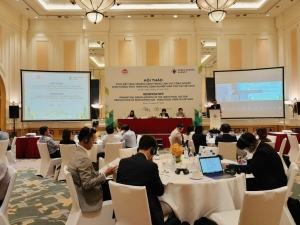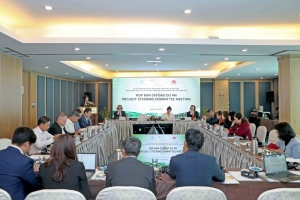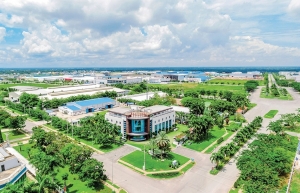Lifting legal barriers for eco-industrial parks to thrive
Many of Vietnam’s major export markets such as Europe, the United States, and Australia have already implemented and are expected to continue introducing increasingly stringent environmental, social, and governance (ESG) standards.
 |
| Dang Phuong Dung, director of Advisory Services Forvis Mazars Vietnam |
In this context, businesses are forced to make changes in their production and business activities. It is undeniable that many businesses in Vietnam are currently actively engaged in reducing carbon emissions and waste and utilising socially responsible inputs in order to meet the ESG criteria.
However, to enhance sustainable and inclusive development, it is essential to establish a close connection between businesses, and industrial parks (IPs) with their role in management and as intermediaries to guide ESG objectives for businesses throughout the entire park are considered ideal for achieving this goal.
The development of eco-IPs, therefore, has implicitly evolved from a mere recommendation to an imperative requirement for establishing IPs in a sustainable manner, as well as enabling businesses to simultaneously achieve ESG goals through collaborative efforts in environmental and resource management. This is also a key factor in attracting investment from foreign companies and Vietnamese businesses who aim to export goods to international markets.
Eco-IPs and related issues have been mentioned in rules regulating the management of IPs and economic zones. The government has also set the goal that by 2030, 40-50 per cent of localities will have planned to convert existing IPs into eco-IPs and 8-10 per cent of localities will have oriented to build new eco-IPs.
However, at the time being, Vietnam has not yet promulgated a sufficiently open legal framework to enhance the development of this filed. Regulations on renewable energy in IPs and tax incentives for eco-IPs could be taken as notable examples.
Businesses involving in developing IPs, who have been and are currently investing in renewable energy projects, are expected to be the primary beneficiaries of the implementation of the direct power purchase agreement (DPPA) mechanism, as stipulated in Decree No.80/2024/ND-CP issued by the government in July.
Within the DPPA framework, IP developers may choose to invest in renewable energy generation projects, thereby assuming the role of renewable energy producers (through directly owning renewable energy power plants and licensed rooftop solar systems) or act as intermediary entities for the purchase and sale of electricity. However, the absence of specific regulations has resulted in certain challenges in implementing and applying the DPPA mechanism.
As an illustration, there are still barriers to IPs proactively installing rooftop solar systems for sale to customers. Additionally, although Decree 80 permits IPs to act as intermediaries in electricity transactions, it has yet to provide detailed guidelines on this matter.
Another example is Decree 80 also leaves unaddressed the procedures for incorporating electrical grids into regional or provincial power plans, as well as the practical feasibility of implementation thereof, given that the increased volume of renewable energy may exert pressure on the grid’s capacity. When specific and detailed criteria have not been set, risks can be posed to the stability of the power system.
For the method of selling electricity through Vietnam Electricity’s transmission line, the challenge lies in optimising the efficiency of negotiations on electricity price and volumes, especially the calculation and determination of electricity price based on the spot market price as stipulated in Article 11 and 12 of Decree 80 to establish contract prices that are adjusted seasonally, annually or according to specific times of the day.
Tax-wise, there are currently no regulations on special incentives for businesses developing eco-IPs. Instead, only general incentives apply, which are determined by geographic areas or specific business activities of each developer, such as clean and renewable energy production, waste collection, treatment, recycling or reuse.
Furthermore, current regulations do not permit the application of corporate income tax (CIT) incentive policy for the primary activity of infrastructure development enterprises in IPs, which is leasing land. Simultaneously, the lack of specific incentives for enterprises having projects in eco-IPs hampers efforts to pull in businesses to select eco-IPs over traditional IPs.
In addition, even the general CIT incentives for projects in IPs (which include a two-year tax exemption and a 50 per cent reduction in taxes for the subsequent four years, except for IPs in economically and socially advantageous areas) are being proposed for elimination in the most recent draft of the law on CIT, which is expected to be enacted in 2025 and come into effect in 2026.
It is evident that, to encourage businesses to undertake eco-IP development projects and to attract investment into them, the government needs to implement more favourable and flexible tax policies specifically tailored for these entities.
Once the legal framework for eco-IPs is in place, lifting existing barriers and promulgating favourable policies are crucial factors to drive the development of this globally trending IP model. Developing eco-IPs not only reaffirms Vietnam’s commitments to sustainable development but also serves as foundation for businesses to approach the stringent standards and requirements of international market, such as achieving green product certifications can act as a gateway for participating in global supply chains.
 | Eco-industrial parks to become inevitable trend Vietnam will continue to encourage investors to both develop eco-IPs and transition from traditional to ecological ones, which is set to contribute to the national target of reducing greenhouse gas emissions. |
 | Vietnam to promote eco-industrial parks with international partners The Steering Committee on the Development of Eco-industrial Parks in Vietnam, organised a meeting yesterday to discuss last year's results and set a course for the following two years of the scheme. |
 | Addressing the barriers to building eco-industrial parks Vietnam, a nation experiencing rapid industrialisation and economic growth, stands at a pivotal point in its developmental trajectory. Rizwan Khan, managing partner, at Acclime Vietnam, looks at the importance of sustainable development and the progress of implementing greener industrial areas. |
What the stars mean:
★ Poor ★ ★ Promising ★★★ Good ★★★★ Very good ★★★★★ Exceptional
Related Contents
Latest News
More News
- Sembcorp Development secures licence for VSIP in Khanh Hoa (December 31, 2025 | 18:54)
- Prodezi Long An advances towards integrated eco-centric industrial park model (December 26, 2025 | 11:16)
- Amata to develop $185 million Amata City Phu Tho (December 23, 2025 | 17:49)
- Work starts on Nhat Ban – Haiphong Industrial Zone Phase 2 (December 19, 2025 | 16:43)
- Becamex – Binh Phuoc drives sustainable industrial growth (November 28, 2025 | 15:22)
- South Korean investors seek clarity on IP lease extensions (November 24, 2025 | 17:48)
- CEO shares insights on Phu My 3 IP’s journey to green industrial growth (November 17, 2025 | 11:53)
- Business leaders give their views on ESG compliance in industrial parks (November 15, 2025 | 09:00)
- Industrial parks pivot to sustainable models amid rising ESG demands (November 14, 2025 | 11:00)
- Amata plans industrial park in Ho Chi Minh City (November 04, 2025 | 15:49)

 Tag:
Tag:




















 Mobile Version
Mobile Version